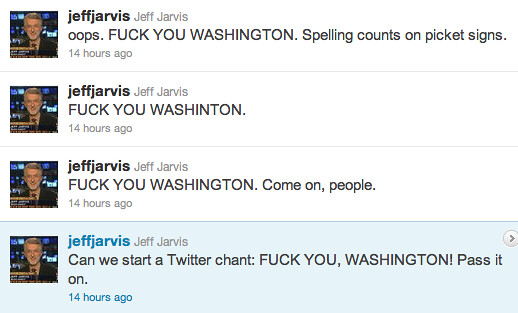On Saturday night, aided by “a nice pinot noir,” the tech and business-of-news writer Jeff Jarvis started to tweet.
“Hey, Washington assholes,” he wrote, “it’s our country, our economy, our money. Stop fucking with it.”
He started rolling. Inspiration struck. “Can we start a Twitter chant: FUCK YOU, WASHINGTON! Pass it on.” He willed the chant into existence.

Eventually, another tweeter set Jarvis straight and crafted this into a hashtag. We could see where this was going. Jarvis, one of the smartest promoters and meme-catchers out there, cultivated and curated a wave of angry tweets, retweeting the best ones, eventually harshing on the censorship that stopped his Howard Beale hashtag from trending. Most of the tweets came from liberals angry at the debt impasse. A small sample:
@mcullen546: #FuckYouWashington for calling programs that we pay for entitlements
@mwynn: We see through your public pension theft conspiracy so #fuckyouwashington
@Mr_Pettapucci #fuckyouwashington or letting corporations steal our natural resources and sell them back to the people for profit.
@rogldr5 #fuckyouwashington for all this posturing to assure your reelection.
@bguthro: #FuckYouWashington for playing russian roulette with the world’s economic stability
He retweeted critics. TPM’s Josh Marshall pointed out that the hashtag put blame on all parties, instead of Republicans. “To use threat of default to leverage policy changes that can’t be one at the ballot box, an unprecedented tactic which amounts to threatening vast damage to country if policy demands r not met (sic),” he wrote. “Generalities instead of specifics serves no purpose.” By making rage generic, Jarvis was muddying the story of the current crisis, making it one of Washington failing, not obstructionist Republicans holding spending and debt limit votes hostage until the last minute in order to extract demands.
But the timing was perfect. As the hashtag was trending, Tom Friedman’s new column was going up. It was longer and less profane than Jarvis’s twitter campaign, but it went after the same emotional triggers. Friedman was pining for “a party that would have offered a grand bargain on the deficit two years ago, not on the eve of a Treasury default.” It was time for some glib claptrap! Friedman swung his endorsement behind Americans Elect, the latest effort (“financed with some serious hedge-fund money”) to use the Internet to create a centrist third party focused on problem-solving.
First, anyone interested in becoming a delegate goes to the Americans Elect Web site and registers. As part of that process, you will be asked to fill in a questionnaire about your political priorities: education, foreign policy, the economy, etc. This enables Americans Elect to put you in contact with others who share your views so you can discuss them and organize together. Then you will be invited to draft a candidate or support one who has already been drafted and to contribute to the list of questions that anyone running on the Americans Elect platform will have to answer on the site.I wasn’t surprised to read this from Friedman. At the Aspen Ideas Festival, I’d heard him muse, to an audience of the sort of people who wouldn’t laugh at “Americans Elect,” that Alan Simpson and Erskine Bowles should consumate their partnership as a presidential ticket. But how can a sophisticated political analyst buy into this? How do you look at the way Washington is actually organized, with multiple legislative veto points that can cripple or kill legislation, and say “we could fix this if a third party won the presidency”?
The people who actually got this were busy with a Ryan Grim scoop about one of the current possibilities being discussed to raise the debt limit. It would involve admitting that Congress doesn’t work anymore, and creating a “Super Congress” that would work the way Bowles-Simpson almost did. That commission had the power to fast-track its proposals if a supermajority of members approved of a plan – inevitably, something that would irritate the constituencies in both parties. This would copy that, but allow a simple majority to put plans in the HOV lane.
With the weight of both leaderships behind it, a product originated by the Super Congress would have a strong chance of moving through the little Congress and quickly becoming law. A Super Congress would be less accountable than the system that exists today, and would find it easier to strip the public of popular benefits. Negotiators are currently considering cutting the mortgage deduction and tax credits for retirement savings, for instance, extremely popular policies that would be difficult to slice up using the traditional legislative process.The tweeters are right: Washington doesn’t work right now. The optimists like Friedman are wrong about how to fix it. The cynics, who are now trying to figure out some way to pass bills without subjecting them to real rigor, are the ones in the best position to win. That’s the legacy of the 2010 elections – the exact opposite of what angry voters said they wanted, something that makes them even angrier.